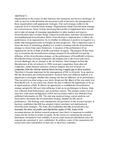| dc.description.abstract | Organizations in the course of their business face numerous and diverse challenges. In
order to survive in the turbulent and uncertain world of business, the management of
these organizations craft appropriate strategies. One such strategy crafted at the
corporate level is diversification strategy. Organizations adopt diversification strategy
for several reasons. Some include increasing their profits to supplement their income
and to take advantage of emerging opportunities in other markets and regions.
Diversification takes on three forms: related diversification, unrelated diversification
and multinational diversification. When diversification is implemented, it affects the
performance of an organization. As to whether its influence is positive or negative is a
matter that management must investigate as time progresses. This is important since it
forms the basis of identifying whether it is worth to continue with the diversification
strategy or divest from some businesses. A measure of the performance of an
organization can be in form of profits and return on equity. The purpose of this study
was to determine the diversification strategy adopted by KenolKobil Ltd and the
influence of this diversification strategy on the performance of KenolKobil in Kenya.
KenolKobil being a Kenyan indigenous oil company has in the recent past faced
several challenges due to changes in the oil industry. Such changes include the
liberalization of the oil industry in 1994, increased competition from other oil
companies, unfair business practices, reduced margins and exit of major oil
companies from the African markets hence leaving a supply gap in those markets.
Therefore it became important for the management of KK to diversify. In as much as
KK has diversified into different products, business lines and different markets, it is
important to investigate whether this strategy has had an influence on its performance.
This research was done using a case study design and the object of the case study was
KenolKobil Ltd. A case study was chosen because it offered the opportunity to do an
in-depth analysis of KK. It offered an opportunity to establish the diversification
strategy adopted by KK and what influence it had on its performance in Kenya. Data
was collected from both primary and secondary sources. The primary source was an
interview with senior management of KK and secondary source was obtained from
published information on KK. The data was analyzed using content analysis and
discussed to determine the diversification strategy adopted by KK and its
performance. The findings were summarized and presented in this research project. It
has been established that KK has adopted related, unrelated and multinational
diversification strategies. The study also established that this diversification has
increased the sales, net profits and shareholder equity of KK. Some of the
recommendations for further research proposed were that it is important to establish
reason for the decline in return on equity. In the course of conducting the research,
limitations encountered were inability to access some financial information since the
respondents considered it very confidential. In addition, some of the respondents did
not provide some information on time due to their busy schedules. | en |


